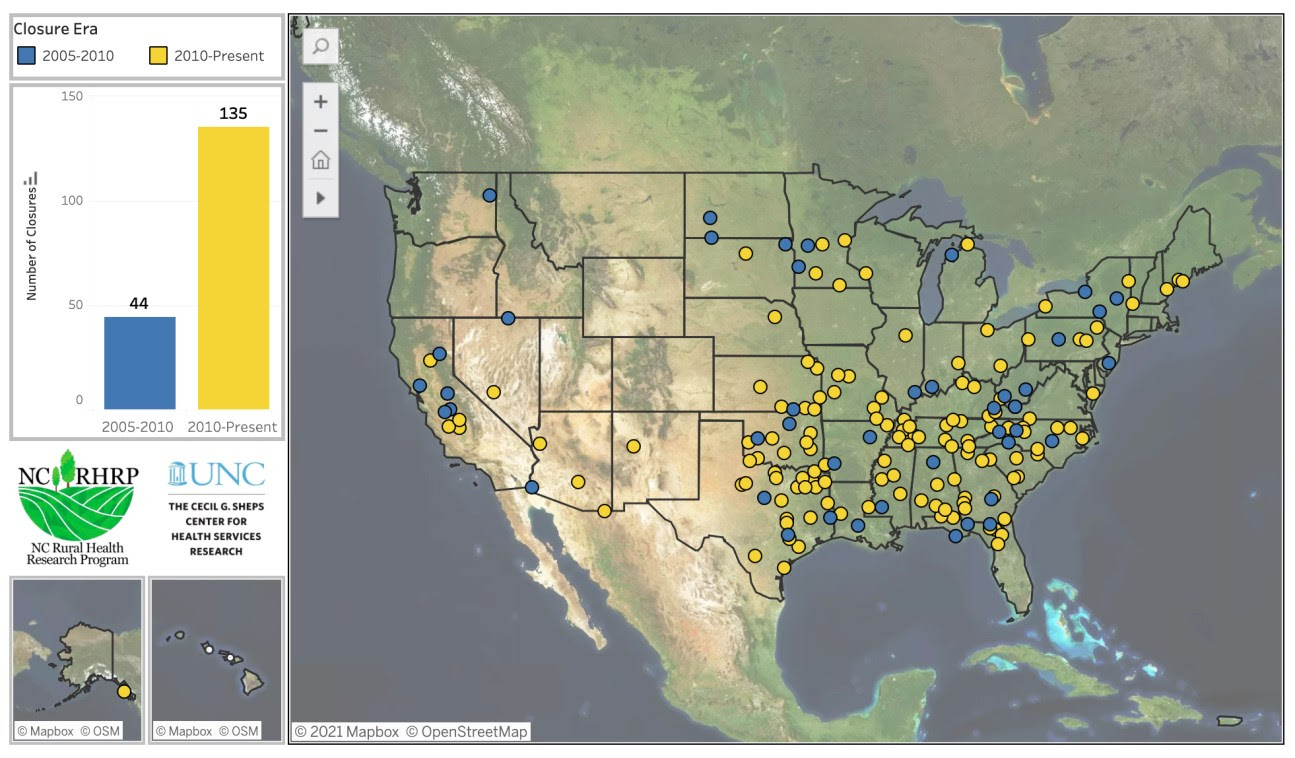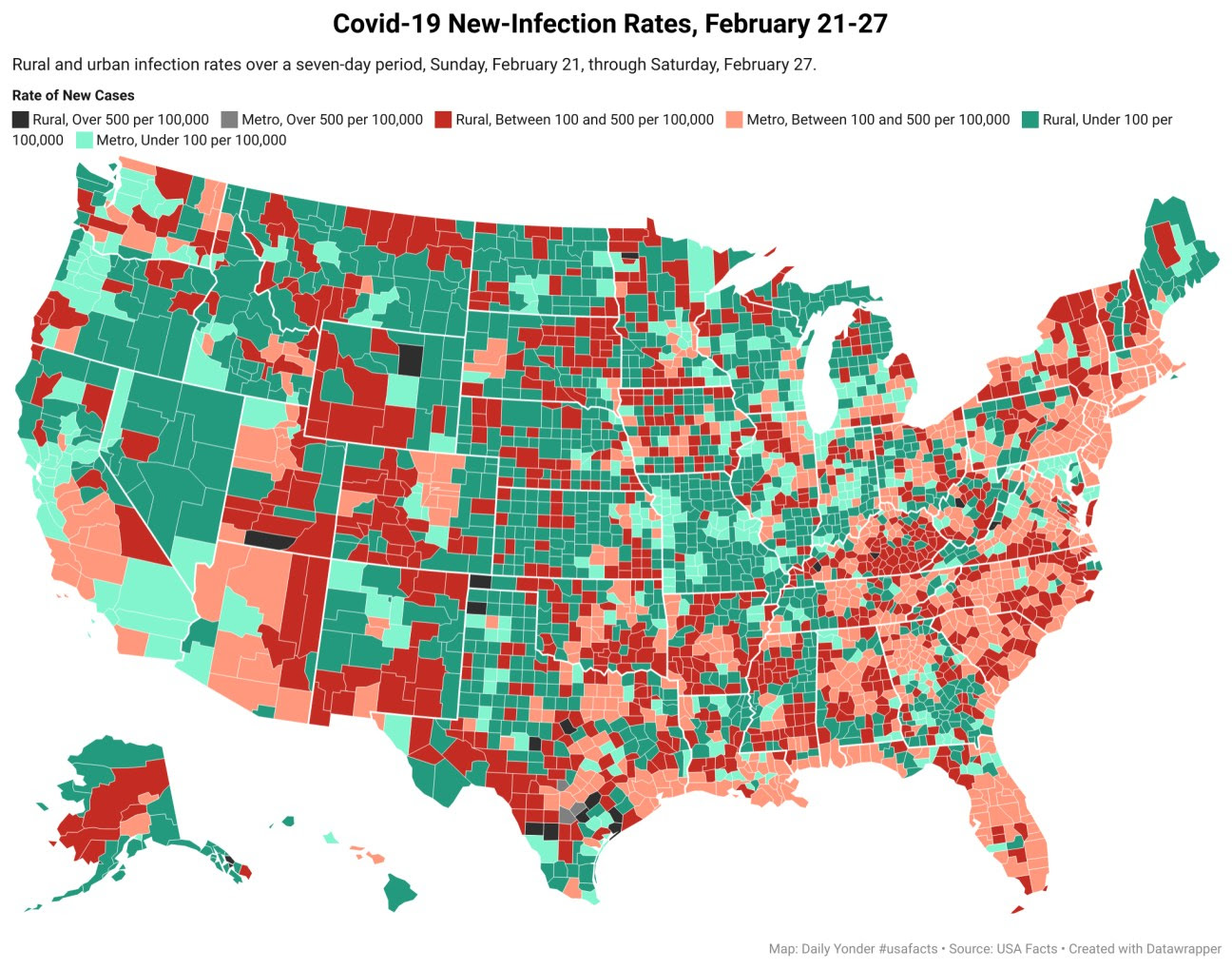- Distance, Workforce Shortages Complicate Mental Health Access in Rural Nevada Communities
- Bird Flu Is Racing Through Farms, but Northwest States Are Rarely Testing Workers
- After Helene, Clinician Teams Brought Critical Care To Isolated WNC Communities
- The Biden-Harris Administration Supports Rural Health Care
- Biden-Harris Administration Announces $52 Million Investment for Health Centers to Provide Care for People Reentering the Community after Incarceration
- On National Rural Health Day, Reps. Sewell and Miller Introduce Bipartisan Legislation to Support Rural Hospitals
- Terri Sewell Cosponsors Bill Reauthoring Program to Support Rural Hospitals
- HRSA: Inclusion of Terrain Factors in the Definition of Rural Area for Federal Office of Rural Health Policy Grants
- DEA, HHS: Third Temporary Extension of COVID-19 Telemedicine Flexibilities for Prescription of Controlled Medications
- Celebrating National Rural Health Day
- Public Inspection: DEA, HHS: Third Temporary Extension of COVID-19 Telemedicine Flexibilities for Prescription of Controlled Medications
- CDC Presents a Five-Year Plan for Rural Healthcare
- Talking Rural Health Care with U of M
- Kansas Faith Leaders 'Well Positioned' To Help Fill Mental Health Care Gaps in Rural Areas
- The CDC Wants More Kansas Farm Workers to Get Their Flu Shots This Season
USDA is seeking Applications for Projects Supporting Regional Economic and Community Development Planning in Pennsylvania
The United States Department of Agriculture (USDA) Rural Development is accepting applications for projects that prioritize strategic investments to grow the economy and build prosperity in rural communities.
Strategic Economic and Community Development (SECD) funding may be used to develop and implement multi-jurisdictional or multi-sectoral strategic community investment plans. Rural Development implements SECD by reserving funds from the appropriations for covered programs.
The deadline to approve and obligate funds for the Community Facilities Direct Loan and Grant Program is June 30, 2021. All Community Facilities Guaranteed Loan applications must also be received prior to this date. In Pennsylvania, projects will be limited to renovations and equipment procurement because of the short application window.
In Pennsylvania, contact your local county loan specialist with questions or additional information.
To apply for SECD funding, applicants must meet all requirements and application deadlines for the program to which they are applying. In addition, applicants must submit Form RD 1980-88, “Strategic Economic Community Development (Section 6401).” Applicants applying for SECD funding through a loan guarantee program may submit forms under the OneRD Guarantee Loan Initiative application guidelines. All SECD direct loans and grant applications should be submitted through a local area loan specialist.
This funding is awarded on a competitive basis. Consideration of proposed projects will be based on:
- How well the project supports multi-jurisdictional plan,
- Whether the plan contains evidence of collaboration among multiple stakeholders,
- Whether the project leverages applicable regional resources; and
- Whether the plan includes clear objectives with measurable metrics.
For additional information, see page 1918 of the January 11, 2021, Federal Register.
If you’d like to subscribe to USDA Rural Development updates, visit our GovDelivery subscriber page.
New from Rural Health Value: Catalog of Value-Based Initiatives for Rural Providers – 2021 Update
The Rural Health Value team recently updated its Catalog of Value-Based Initiatives for Rural Providers. Includes one-page summaries of various HHS value-based programs appropriate for rural participation.
Catalog of Value-Based Initiatives for Rural Providers. Summarizes rural-relevant, value-based programs to help rural leaders and communities identify Department of Health and Human Services (HHS) value-based programs appropriate for rural participation. Covers programs implemented by HHS, primarily by the Centers for Medicare & Medicaid Services and its Center for Medicare & Medicaid Innovation. Recent catalog additions include 1) Community Health Access and Rural Transformation (CHART) Community Transformation and Accountable Care Organization Tracks 2) the Radiation Oncology Model, and 3) the Value in Opioid Disorder Treatment Model. (Updated 2021)
Commentary: Extreme Weather Impacts Heating Costs Outside Hard-Hit Texas

By Donna Kallner
Residents of other small towns and rural areas may see a related spike on upcoming utility bills.
Read more
Rural Hospitals Risk Closure Due to Covid-19-Related Drop in Revenue in 2021

By Liz Carey
The American Hospital Association warns that without continued government support, many rural hospitals will be forced to shut their doors, leaving patients without care and local economies without their main employer and consumer.
Read more

Rural Vaccination Rates Vary, and Data Is Hard to Come By
By Liz Carey
In two-thirds of the states where we can track vaccinations by county, rural areas are doing relatively well. One reason may be that a greater percentage of the rural population is eligible for the first rounds of vaccination.
Read more

Covid-19 Improvement Levels off after Weeks of Lower Rural Infection Rates

By Tim Murphy and Tim Marema
After dropping by an average of 20% each week for six straight weeks, the number of new Covid-19 cases fell by only 1% last week. It’s too soon to say if the change represents a pause or reversal in improvement, or simply an anomaly in data reporting caused by severe weather.
Read more

Quality Insights 2021 SMBP Practice Module
Quality Insights is honoring American Heart Month with the release of the 2021 Screening, Measurement, and Self-Management of Blood Pressure (SMBP) Practice Module. This updated resource is designed to promote cardiovascular health and blood pressure management, both in the clinical setting and at home. New to the SMBP Practice Module:
- Highlights and resources from The Surgeon General’s Call to Action to Control Hypertension
- Review of newly released (2020) scientific evidence supporting SMBP
- Strategies for improving team-based care, medication adherence and accurate blood pressure measurement
- Resource links for implementing SMBP in your practice, including toolkits, validated device listing, and more
Download the SMBP Practice Module and accompanying Workflow Modification guide today.
American Diabetes Association Patient Education Library
The American Diabetes Association (ADA) Patient Education Library offers free, downloadable diabetes education resources that can be filtered by category and language. There are eleven language options and it offers items that include:
- Prediabetes: What Is It and What Can I Do?
- Are You at Risk for Type 2 Diabetes?
- Factors Affecting Blood Glucose
- Diabetes: An Introduction
- Diabetes Symptoms (describes symptoms of Type 1 and Type 2 diabetes
You can also access additional multilingual education resources covering a variety of health topics on the National Institute of Diabetes and Digestive and Kidney Diseases (NIDDK) and the National Library of Medicine.
ACOG Summary & Slides of Recent Pregnancy & COVID-19 Vaccine Call
The one-page summary and slides of the American College of Obstetrics and Gynecology’s (ACOG) position on COVID-19 vaccination and pregnancy presented during a recent National Adult and Influenza Immunization Summit’s (NAIIS) call are now available. ACOG recommends that COVID-19 vaccines not be withheld from pregnant individuals who meet criteria for vaccination, and these individuals should be free to make their own decision regarding vaccination. Pregnant individuals are encouraged to discuss this decision with their healthcare team, but documentation of this discussion is not required. They also recommend that COVID-19 vaccines be offered to lactating individuals based on their prioritization group. There is no need to avoid starting nor to discontinue breastfeeding in people who receive a COVID-19 vaccine. They also offer helpful resources on COVID-19 and pregnancy on their webpages. These are excerpted on a handy one-page document.
Mental Health and Substance Abuse Services Telehealth Survey
The Pennsylvania Office of Mental Health and Substance Abuse Services (OMHSAS), with support from the Pennsylvania Department of Drug and Alcohol Programs (DDAP), released the OMHSAS Telehealth Survey Report. This telehealth survey was conducted in the Spring of 2020, during the initial onset of COVID-19. The results of the Telehealth Survey have allowed OMHSAS to hear directly from stakeholders and to better understand their experiences with and access to telehealth during these tumultuous and difficult times. Here is a link to the OMHSAS Telehealth Survey Report on OMHSAS’s Telehealth webpage. If you would like to contact OMHSAS about this report, please send an email to RA-PWTBHS@pa.gov.

